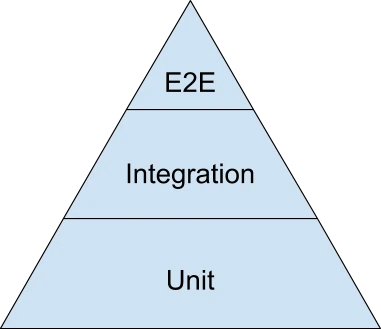
How does unit test work ? How to do unit test on Quarkus ?
 Natan Ferreira
Natan Ferreira- 2
- 1108
Testing a system is very important to maintain quality. There are some types of tests.

Closer to the base of the pyramid, less cost and time are required.
Let’s focus on the base of the pyramid.
Unit test serves to validate the smallest code units. Generally a system accesses some external service such as a database, an API, but unit test does not test this integration. When there is an external dependency on the unit to be tested, we use mock. It is a fake call to the external service.
Unit test doesn’t care about integration, it is independent.

Got confused ? Don’t worry, below I’ll show you in practice how to do it. The purpose is to have an understanding of how it works. We have a success / failure scenario and I will show you how to mock it.
Requirements
I’m using JDK 17, Intellij and Quarkus Version 3.4 on the project.

I used these dependencies:
<dependencies>
<dependency>
<groupId>io.quarkus</groupId>
<artifactId>quarkus-arc</artifactId>
</dependency>
<dependency>
<groupId>io.quarkus</groupId>
<artifactId>quarkus-resteasy-reactive</artifactId>
</dependency>
<dependency>
<groupId>io.quarkus</groupId>
<artifactId>quarkus-resteasy-reactive-jackson</artifactId>
</dependency>
<dependency>
<groupId>io.quarkus</groupId>
<artifactId>quarkus-rest-client-reactive-jackson</artifactId>
</dependency>
<dependency>
<groupId>io.quarkus</groupId>
<artifactId>quarkus-junit5</artifactId>
<scope>test</scope>
</dependency>
<dependency>
<groupId>io.quarkus</groupId>
<artifactId>quarkus-junit5-mockito</artifactId>
<scope>test</scope>
</dependency>
<dependency>
<groupId>io.rest-assured</groupId>
<artifactId>rest-assured</artifactId>
<scope>test</scope>
</dependency>
</dependencies>I created the project on Quarkus Web Site using this link: https://code.quarkus.io
Practice
I’m not going to talk about TDD this time.
In the following example, I will show a service and the objective is to test it.
package com.natancode.services;
import com.fasterxml.jackson.core.JsonProcessingException;
import com.fasterxml.jackson.core.type.TypeReference;
import com.fasterxml.jackson.databind.ObjectMapper;
import com.natancode.rest.ExtensionsService;
import jakarta.enterprise.context.ApplicationScoped;
import jakarta.inject.Inject;
import org.eclipse.microprofile.rest.client.inject.RestClient;
import java.util.Set;
@ApplicationScoped
public class CalculatorService {
@Inject
@RestClient
ExtensionsService extensionsService;
@Inject
ObjectMapper objectMapper;
public Integer sum(Integer n1, Integer n2) throws Exception {
checkIfValuesAreNull(n1, n2);
return n1 + n2;
}
public Integer decrease(Integer n1, Integer n2) throws Exception {
checkIfValuesAreNull(n1, n2);
checkIsForbiddenNumber(n1, n2);
return n1 - n2;
}
private static void checkIfValuesAreNull(Integer n1, Integer n2) throws Exception {
if(n1 == null || n2 == null) {
throw new Exception("The values cannot be null");
}
}
private void checkIsForbiddenNumber(Integer n1, Integer n2) throws Exception {
var forbiddenNumbers = getForbiddenNumbers();
if(forbiddenNumbers.stream().anyMatch(e -> e.equals(n1) || e.equals(n2) )) {
throw new Exception("The values cannot be forbidden");
}
}
private Set<Integer> getForbiddenNumbers() throws JsonProcessingException {
var response = extensionsService.getForbiddenNumbers();
var forbiddenNumbers = response.getJsonArray("forbiddenNumbers");
return objectMapper.readValue(forbiddenNumbers.toString(), new TypeReference<Set<Integer>>(){});
}
}
Let’s start with the sum method. It receives two values, checks if any of them are null, if any of them are null it throws an exception, if none of them are null, they do the sum and return the result.
Sum Method:
public Integer sum(Integer n1, Integer n2) throws Exception {
checkIfValuesAreNull(n1, n2);
return n1 + n2;
}Check if any value is null:
private static void checkIfValuesAreNull(Integer n1, Integer n2) throws Exception {
if(n1 == null || n2 == null) {
throw new Exception("The values cannot be null");
}
}The tests need to be inside the test folder.
@QuarkusTest
public class CalculatorServiceTest {
@Inject
CalculatorService calculatorService;
@Test
public void shouldSum() throws Exception {
//scenario
Integer n1 = 10;
Integer n2 = 10;
//action
var sumResponse = calculatorService.sum(n1, n2);
//verification
Assertions.assertEquals(20, sumResponse);
}
}Testing without mock
quarkus-junit5 is required for testing, as it provides the @QuarkusTest annotation that controls the testing framework.
@Inject is for access the service’s methods.
@Test
public void shouldSum() throws Exception {
//scenario
Integer n1 = 10;
Integer n2 = 10;
//action
var sumResponse = calculatorService.sum(n1, n2);
//verification
Assertions.assertEquals(20, sumResponse);
}We need to inform the name of the method as a scenario to be tested. In this case, the sum must be successful.
Important structure to understand the test.
scenario: we prepare what should be tested;
action: this is what we are going to test;
verification: we check whether the result of the action is as expected. In this case, the sum must be returned successfully.
Now let’s look at a failure scenario.
@Test
public void shouldNotSum() {
//scenario
Integer n1 = null;
Integer n2 = 10;
//verification
assertThrows(Exception.class, () -> calculatorService.sum(n1,n2));
}The sum method does not call an external service, so there was no need for a mock. We will see an example with mock below.
Testing with mock

As I said before, unit tests are independent, they do not test integration with external services.
Let’s test the decrease method, as it makes a call to an external service.
Decrease Method:
public Integer decrease(Integer n1, Integer n2) throws Exception {
checkIfValuesAreNull(n1, n2);
checkIsForbiddenNumber(n1, n2);
return n1 - n2;
}checkIsForbiddenNumber is a method that calls an external API.
private Set<Integer> getForbiddenNumbers() throws JsonProcessingException {
var response = extensionsService.getForbiddenNumbers();
var forbiddenNumbers = response.getJsonArray("forbiddenNumbers");
return objectMapper.readValue(forbiddenNumbers.toString(), new TypeReference<Set<Integer>>(){});
}@Path("/forbidden-numbers")
@RegisterRestClient
public interface ExtensionsService {
@GET
JsonObject getForbiddenNumbers();
}ExtensionService makes the request to an api that returns a json with the prohibited numbers.
As unit tests are independent, we cannot make the real call, we have to simulate, make a fake call.
@Test
public void shouldDecrease() throws Exception {
//scenario
Integer n1 = 10;
Integer n2 = 10;
ExtensionsService customMock = new ExtensionsService() {
@Override
public JsonObject getForbiddenNumbers() {
return new JsonObject("{\"forbiddenNumbers\":[5,7,23]}");
}
};
QuarkusMock.installMockForType(customMock, ExtensionsService.class, RestClient.LITERAL);
//action
var decreaseResponse = calculatorService.decrease(n1, n2);
//verification
Assertions.assertEquals(0, decreaseResponse);
}In this example I used QuarkusMock for this but we can use mockito.
We need @InjectMock to use mockito. Use this import: import io.quarkus.test.InjectMock; because there is another import that in more recent versions of Quarkus is deprecated.
@InjectMock
@RestClient
ExtensionsService extensionsService; @Test
public void shouldDecrease() throws Exception {
//scenario
Integer n1 = 10;
Integer n2 = 10;
Mockito.when(extensionsService.getForbiddenNumbers())
.thenReturn(new JsonObject("{\"forbiddenNumbers\":[5,7,23]}"));
//action
var decreaseResponse = calculatorService.decrease(n1, n2);
//verification
Assertions.assertEquals(0, decreaseResponse);
}
Conclusion
After writing the unit test, we can run it quickly, unlike manual testing, thus its saves time and money.
When we test a specific part of the code, we are able to validate all of its logic, which helps to avoid and find bugs. We also do not depend on external services. We have a lot of benefits from doing unit test.
The code is available here: https://github.com/natanlf/quarkus-unit-tests.git

Author
-

I am a seasoned Full Stack Software Developer with 8+ years of experience, including 6+ years specializing in Java with Spring and Quarkus. My core expertise lies in developing robust RESTful APIs integrated with Cosmos Db, MySQL, and cloud platforms like Azure and AWS. I have extensive experience designing and implementing microservices architectures, ensuring performance and reliability for high-traffic systems. In addition to backend development, I have experience with Angular to build user-friendly interfaces, leveraging my postgraduate degree in frontend web development to deliver seamless and responsive user experiences. My dedication to clean and secure code led me to present best practices to my company and clients, using tools like Sonar to ensure code quality and security. I am a critical thinker, problem solver, and team player, thriving in collaborative environments while tackling complex challenges. Beyond development, I share knowledge through my blog, NatanCode, where I write about Java, Spring, Quarkus, databases, and frontend development. My passion for learning and delivering innovative solutions drives me to excel in every project I undertake.
2 thoughts on “How does unit test work ? How to do unit test on Quarkus ?”
Comments are closed.

Great work, Natan. Unit tests are baseline to build any systems. We could get less problems if this matter was taken more seriously.
Very good, bro!
For sure. Thanks